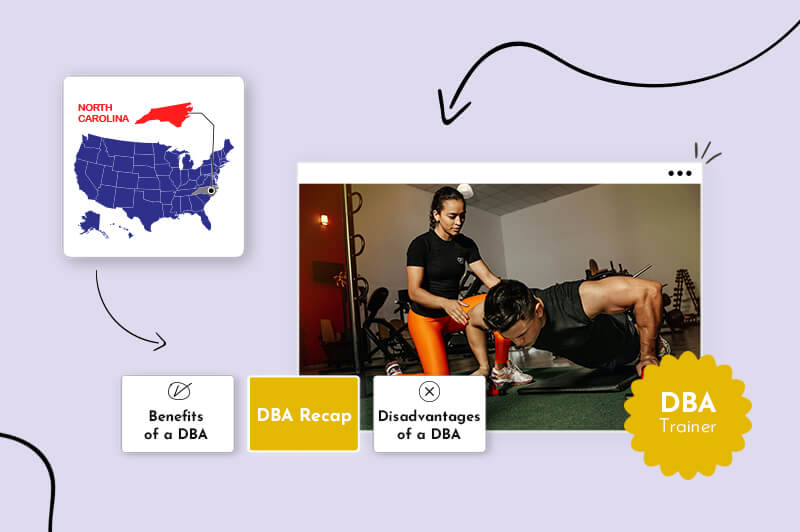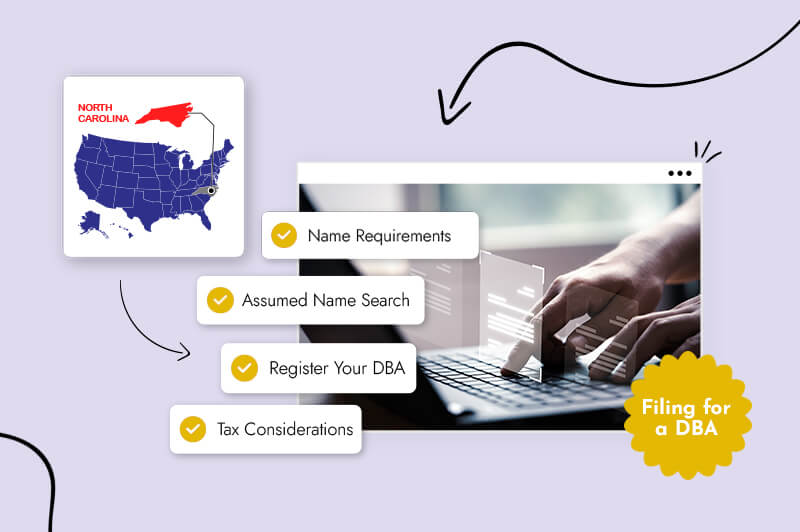
When you register your LLC in NC, the LLC gets an official legal name. You’ll need to use the legal name for some official purposes, such as paying taxes.
You might want to have another name that you can use for operating your business. Perhaps a different name would better promote the nature of your brand. You could also choose to have multiple alternative names that you could use for different aspects of your business.
These names are known as DBA names or assumed business names. In North Carolina, you must register your chosen assumed business names before you can use them.

A DBA (which is an acronym for “Doing Business As”) is a business name that is different from the legal name of the business. A DBA is sometimes referred to as a “fictitious name” or a “trade name.” In North Carolina, a DBA is most commonly called an “assumed business name.”
In North Carolina, you need to register an assumed business name with your local Registrar of Deeds before you can begin using it. Once the name is registered, you can operate your business under that name. You will, however, still need to use your LLC’s legal name for some official purposes, including paying taxes.
Any type of business can use an assumed business name, including a sole proprietorship, partnership, LLC, or corporation.
If you’ve already formed your LLC, an assumed business name might better convey your brand than your LLC’s legal name. For example, if your LLC’s legal name is bland or matter of fact, a more descriptive, catchy, or memorable assumed name might work better as the name of a restaurant or store or as the name you use in your advertising.
Alternatively, you could register an assumed business name even if you don’t have a formal business entity.
Like sole proprietorships and single member LLCs without employees, business owners who have an assumed business name without a formal business entity do not need to get an Employer Identification Number (EIN) from the IRS.
Using an assumed business name on its own will not provide any liability protection if you have not also formed an LLC. Unlike registering an LLC, registering an assumed business name does not create any kind of formal business entity. It’s having the LLC, not the assumed business name, that may provide you with protection from personal liability for the debts of the business.
No. Having an assumed business name is completely optional.
Deciding to get an assumed business name will depend on your business strategy. Think about how you want to brand your business. Do you want to use your LLC’s legal name for all purposes? Would an assumed name be easier to remember, and/or would it make your branding stronger?

Your assumed business name can be a powerful tool for branding. When you choose a name, think about selecting one that will stick in the minds of your customers and potential customers.
Ideally, your assumed business name should also convey something about your business. That could be by using words that describe what your business does, or it could be just by conveying a certain tone or mood, such as cute or traditional, that matches the “feel” of your business.
The name should not be the same or substantially similar to the names of other businesses in the state.
North Carolina prohibits businesses from using certain words in their business names without official approval. For example, you can’t use the words “Bank” or “Architect” unless you can prove you have the legal qualifications to use them.
Also, check with the county where you are requesting your assumed name to see if it has any additional requirements.
Before going any further, you should check to make sure another business in North Carolina has not already claimed your desired assumed name. Do a search online on the Secretary of State’s Assumed Business Name search page to find existing business names in the state.
To register your North Carolina DBA, fill out the Assumed Business Name Certificate form. You can register up to five different assumed names on a single form.
Before you turn in your Name Certificate form, make sure that you have included:
Find the Register of Deeds in the county that is your LLC’s principal place of business. Their webpage will provide their physical and mailing addresses. You only have to register the Certificate in one county, even if your LLC is conducting business in more than one.
Bring your completed Assumed Business Name Certificate along with the required fee to the Register of Deeds office, or mail the form and the $26 fee to the mailing address provided on the Register of Deed’s webpage.
In North Carolina, filing the Assumed Name Certificate is typically done in person or by mail, rather than online.
The cost to file the Assumed Name Certificate is $26.
You’ll need to file the Assumed Name Certificate with the Register of Deeds in the county that is your LLC’s primary place of business. There are 100 counties in North Carolina, so there are too many Registers of Deeds offices to list here.
Fortunately, you can easily find the physical address, mailing address, phone numbers, and any other contact information you need for the applicable Register of Deeds using this handy map from the North Carolina Association of Registers of Deeds.
If you use a business name without registering it, you could be sued. Also, if you knowingly provide false information on your registration form, you could be charged with a misdemeanor.
Registering an assumed business name doesn’t change the way your LLC is taxed. That’s because the assumed business name doesn’t create a new business structure.
Registering an assumed business name in North Carolina provides several advantages, whether you’ve already formed an LLC or not. However, if you haven’t finished registering your LLC, you are missing out on the protections and other advantages an LLC provides. If you’re ready to take the next step toward making your LLC official, take a look at our North Carolina LLC page to learn more.
This portion of our website is for informational or educational purposes only. Tailor Brands is not a law firm, and the information on this website does not constitute legal advice. All statements, opinions, recommendations, and conclusions are solely the expression of the author and provided on an as-is basis. Accordingly, Tailor Brands is not responsible for the information and/or its accuracy or completeness. It also does not indicate any affiliation between Tailor Brands and any other brands, services or logos on this page.
Products
Resources
©2025 Copyright Tailor Brands